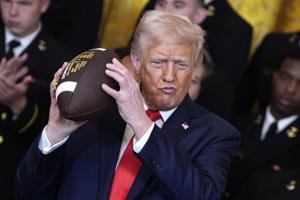The recent presidential commentary on the Washington Commanders’ name change underscores a persistent and fascinating intersection between American politics and the nation’s most beloved sport, football. This confluence, often dismissed as trivial, serves as a potent barometer for cultural discourse and a strategic platform for political figures to exert influence and consolidate support among a vast electorate.
When former President Donald Trump publicly demanded that the Washington Commanders revert their moniker to the Redskins—a name laden with historical controversy and officially retired in 2020—it surprised few. This directive was not merely a casual remark but a calculated move characteristic of a political playbook that has repeatedly leveraged divisive cultural issues to rally a specific base.
Indeed, Trump has consistently demonstrated an inclination for engaging in culture war skirmishes, and the sprawling arena of professional sports, particularly the National Football League (NFL), provides an ideal backdrop. The highly publicized debates surrounding national symbols, team identities, and athlete activism offer politicians fertile ground to articulate their positions and draw clear lines in the sand, often to galvanize supporters.
Historically, American presidents have skillfully utilized football to bolster their public standing and project an image of relatable leadership. From traditional White House visits by championship teams to ceremonial coin tosses, the sport offers a unique avenue for presidents to connect with the populace on a deeply emotional and unifying level, thereby transcending traditional political divides.
During his first term, Trump masterfully employed this strategy, particularly in response to NFL players kneeling during the National Anthem. His outspoken criticism of these protests resonated deeply with a segment of the population, framing the issue as one of patriotism and respect, and solidifying his image as a defender of traditional American values, a move widely perceived as electorally successful.
The cultural significance of football in the United States makes it an irresistible target for political engagement. Its vast viewership, dedicated fan bases, and deeply ingrained role in national identity ensure that any presidential rhetoric on the sport commands widespread attention and sparks vigorous debate, thereby amplifying the political message.
Such presidential interventions carry significant implications for team organizations, brand management, and the intricate dynamics within the sports industry. These comments can force teams to navigate complex public relations challenges, balance stakeholder expectations, and potentially alienate or invigorate fan segments based on their political leanings, further intertwining football politics.
In conclusion, the enduring link between high-stakes politics and the gridiron highlights how presidential rhetoric is not confined to policy debates but extends into the cultural fabric of the nation. The ongoing saga of presidential engagement with football serves as a compelling reminder of the sport’s powerful role as both a cultural touchstone and a strategic political instrument in the American landscape.





Leave a Reply